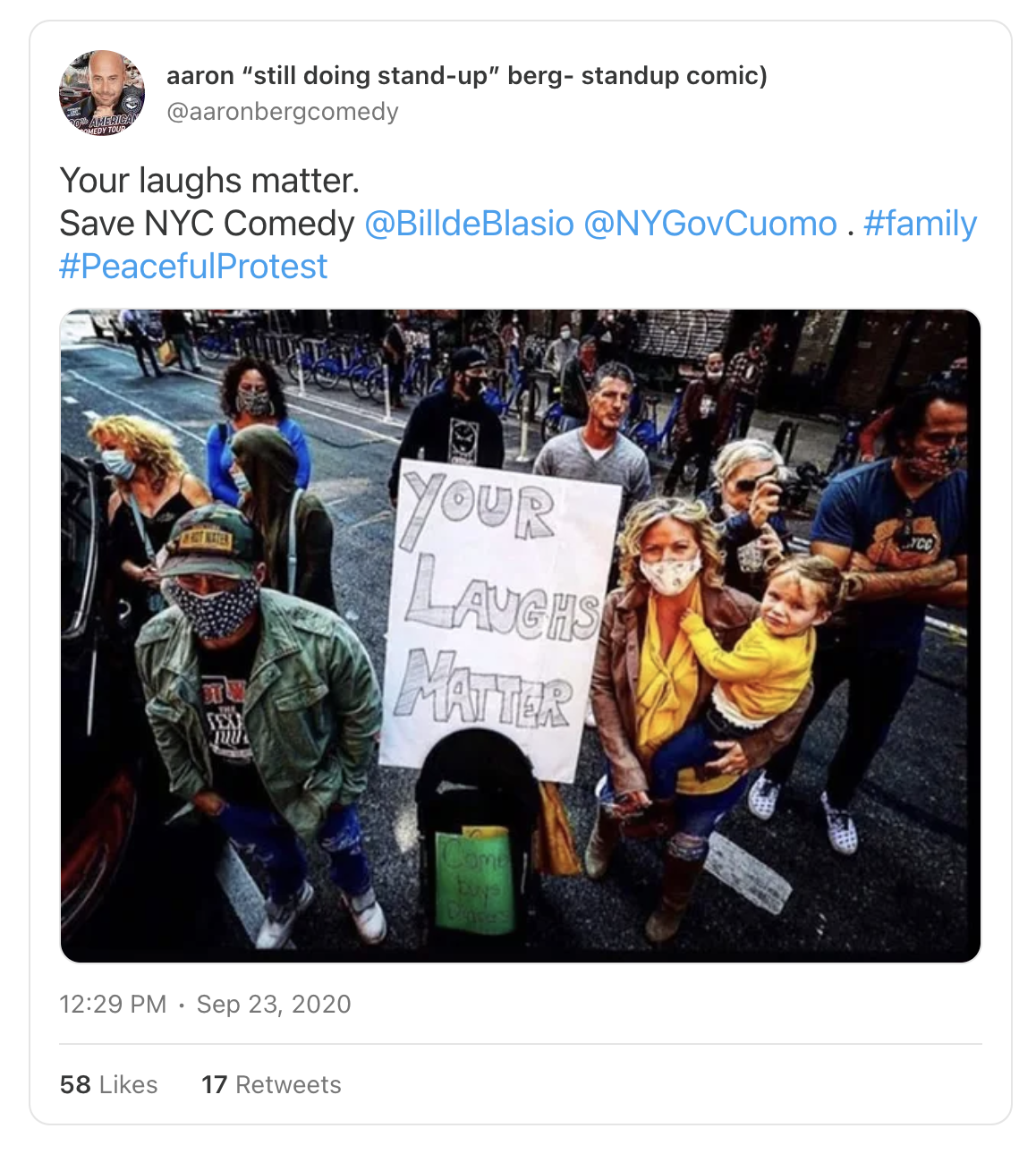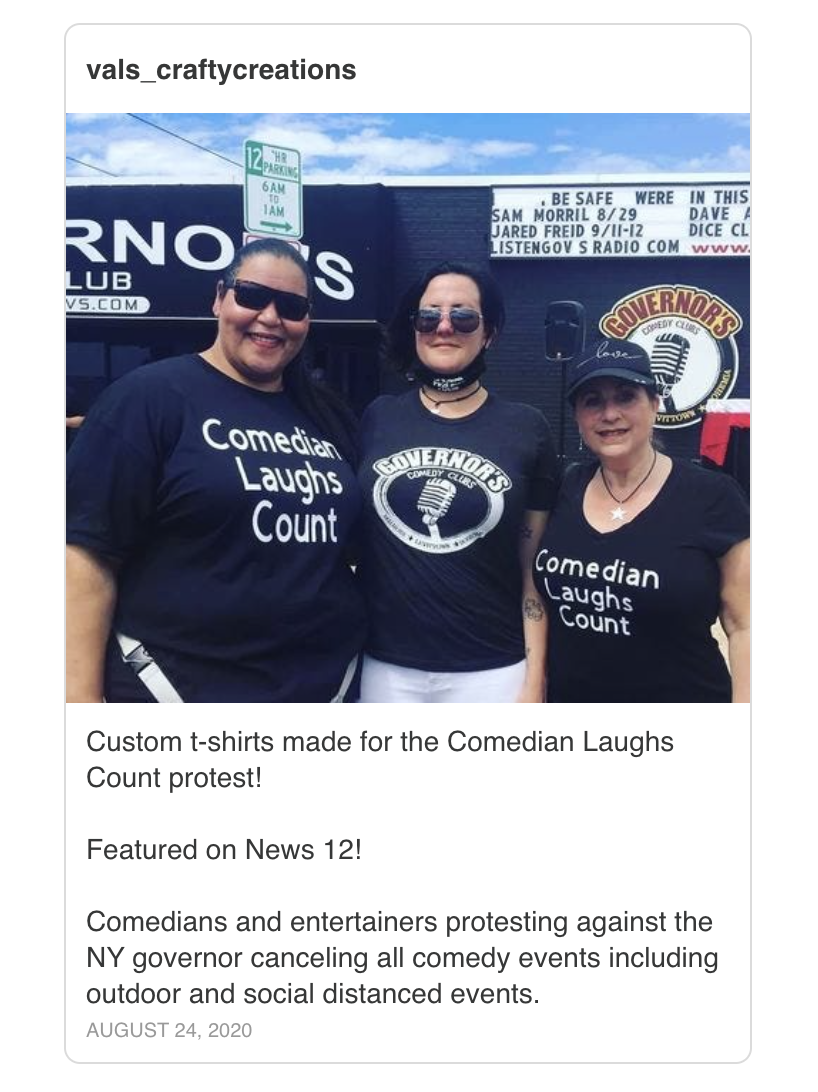"Comedian Laughs Count"
and other dumb shit. then some fun shit

Yesterday I wrote about the lobbying effort to reopen live indoor comedy in New York City. I want to briefly discuss an angle I didn’t focus on in the piece.
It may have caught your eye that several clubs in the “New York Comedy Coalition” are either not paying rent right now or not paying rent at pre-pandemic levels. West Side Comedy, Carolines on Broadway, and the Stand have all worked out arrangements with their landlords, who understand that it’s more in their interests to wait until business returns than to find new tenants. The Comedy Cellar doesn’t have any rent burden either—the club’s owner owns the property—and Felicia Madison of West Side suggested to me that most of the other clubs have either reached similar arrangements or are paying rent out of federal relief funding like the Paycheck Protection Program.
This doesn’t mean those clubs have no other expenses, but it does mean their circumstances aren’t as fatalistic as the campaign suggests. As Madison said, her club can survive a longer shutdown. If it opens, it will have to start paying not only rent and those other expenses, but also payroll and whatever costs are involved in keeping the space Covid-safe. And it will have to do all this at 25% of its usual capacity. This is why she cannot run West Side under the Coalition’s proposed guidelines; the owner of Carolines on Broadway she won’t reopen for the same reasons. The plan to save comedy clubs would ruin them.
So what’s going on, exactly? If a venue like QED, whose owner organized the effort, can avoid disaster with ticketed outdoor shows, and several of the Coalition’s members face no imminent threat unless they reopen indoor shows, why the movement to reopen indoor comedy? Why are some clubs lobbying for something they don’t want?
One answer is that comics want them to.

As Felicia Madison told me, many clubs see this effort as a way to serve their talent, even if it doesn’t particularly serve the business. Other stakeholders I’ve spoken to on background echoed this sentiment. A critical mass of standup comedians want to get back to doing comedy in comedy clubs, and they’re pressing club owners to do something about it.
New York comedy clubs need to open immediately. People desperately need to laugh. It can be done safely. Enough is enough!
— Jessica Kirson (@JessicaKirson) September 23, 2020
Obviously this is not a new phenomenon. Comedians have been demanding the return of live comedy since late spring. Sometimes their reasoning is based in financial realities, but often they’re very open about the other reasons: they’re bored, they’re not terribly concerned about the virus, and they want to do the thing that makes them feel good. As Jeff Dye put it in May:
“I dealt with it pretty selfishly,” Dye says. “I’m not afraid, I wanna go tell jokes. I’m wearing the mask out of respect for others, but if you want to come hug me I don't give a shit. I don't care… The people that come to my shows obviously don't seem to care either. So if they get me sick or I get them sick, fuck ‘em. They came out. It's like, I’m not hurting gram-gram, she's at home. And I know that that's a selfish take, and I'm admitting that I'm selfish, because I just want to get back to comedy so bad. And I'm so tired of being at my house with my dog. I tried to do one of those virtual shows, had a great time, but it wasn’t the same… I needed it. I need my hotel rooms, I need to flirt with girls, I need to tell jokes. I needed some sort of semblance of what I’m used to.”
What distinguishes this current push is that the comics behind it have months’ worth of data showing that the risks outweigh the benefits. Their colleagues caught Covid on the road, research suggests reopened restaurants pose a significant risk of infection, and audiences have proven more than willing to pay for online shows and direct subscriptions. Emilio Savone, owner of the five-location New York Comedy Club, said in a recent interview that he’s produced Zoom shows with 700 viewers; Madison said she’s kept comics paid with online shows that make no money for her business. Comedy can adapt. There is no existential need for comics to risk their clubs’ futures, or to force service workers off unemployment and into harm’s way.

I suspect that’s why so much rhetoric around reopening frames the issue in these insulting social justice terms. “Your Laughs Matter.” “Comedian Laughs Count.” “People need to laugh!” The subliminal message here is Comedy is essential. And they’re right! It is. We’re all very lucky to have so many ways to consume it without endangering ourselves or anyone else: television, podcasts, YouTube, Twitter, Instagram, Twitch, Zoom, TikTok, New Yorker cartoons, written humor, it’s a veritable golden age out there. Which inconveniently is why live comedy is not essential at all right now. The people need to laugh, and they can whenever they want.
BdB: It's time to address comedy clubs and do it right, we'll work with state, make decision in a few days.
— Kate Hinds (@katehinds) September 25, 2020
Remember this the next time anyone tells you collective action isn’t possible in standup comedy. Comics pressured clubs to lobby for reopening. That means they can pressure clubs for other things too.
It’s been a bit since I sent a list of my famous Seth’s Picks. Well, here are some of those:
-I very much enjoy the sketches Grace Thomas has been putting out on Twitter, especially this one (I am a sucker for overwrought math-based jokes):
How many gay people are there? pic.twitter.com/8lK1kPsC1E
— Grace Freud (@GraceGFreud) September 17, 2020
-Anthony Jeselnik and Gregg Rosenthal’s podcast returned this week from a long hiatus. I don’t listen to a lot of podcasts but I do listen to this one, I suppose for all the usual subjective reasons: it makes me laugh, the hosts have good chemistry and no sacred cows, occasionally there’s industry gossip… hell yeah.
-I also listen to Citations Needed, while we’re at it, which just put out a fascinating episode on how the right shaped pop country music, check that out too.
-I’ve been impressed with Tooning Out the News, the animated cable news satire from Stephen Colbert and the creators of Our Cartoon President. It’s not exaaactly my style, but I do enjoy a good Jeremy and Rajat fix every now and then, and I appreciate its willingness to tell guests they’re full of shit. Now, if only the guy who executive produces the show and made his name doing what it’s doing would follow its lead…
-Justin Linville and Maya Sharma are two very funny comics whom I dearly miss seeing live. They launched a friends-chatting-about-stuff-and-doing-riffs-style podcast earlier this month: give it a listen on your platform of choice, and if you like what you hear, allow me to recommend their Patreon.
-Tim Heidecker and Weyes Blood made a concept album? Yes thank you.
-Not comedy, but if you haven’t read it yet, Vincent Bevins’ The Jakarta Method is an essential read about US-backed anticommunist violence around the world, focusing on the mass killings in Indonesia in the 1960s.
Alright, I think that’s all from me today. See you next time.


